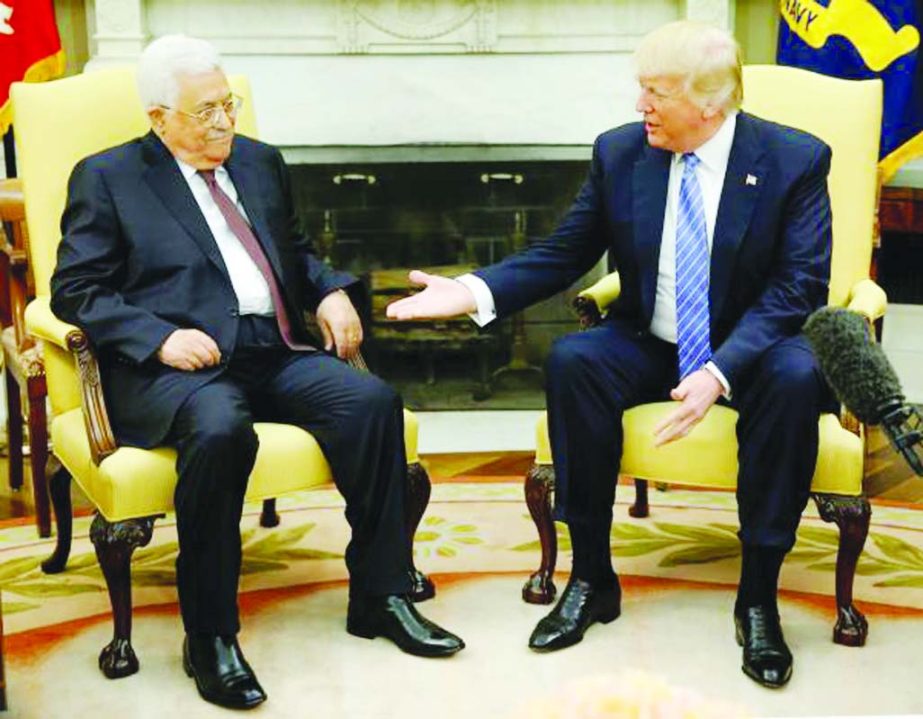
Reuters, Washington :
President Donald Trump vowed on Wednesday to do “whatever is necessary” to broker peace between Israel and the Palestinians as he hosted Palestinian President Mahmoud Abbas at the White House, but gave no sign of how he could revive long-stalled negotiations.
In their first meeting, Trump pressed Abbas to do more to stop “incitement to violence” against Israelis and, according to the White House, urged him in private to halt payments to families of Palestinian prisoners held in Israeli jails, a demand long pressed by Israel. Even as Trump boldly predicted he would achieve peace where other presidents had failed, he stopped short of explicitly recommitting his
administration to a two-state solution to the decades-old conflict, a long-standing foundation of U.S. policy. Some Palestinians said they were disappointed by the omission. Despite what many experts see as a long-shot bid, Trump told Abbas: “I will do whatever is necessary. … I would love to be a mediator or an arbitrator or a facilitator, and we will get this done.” Abbas reasserted the goal of a Palestinian state, saying it must have East Jerusalem as its capital with the borders that existed before the 1967 Middle East war. Most Israelis want all of Jerusalem as their capital and reject a full return to 1967 borderlines as a threat to their security.
Trump has faced deep skepticism at home and abroad over the chances for him to achieve any quick breakthrough, not least because his administration has yet to articulate a cohesive strategy for restarting the moribund peace process. Abbas’ White House talks followed a February visit by Israeli Prime Minister Benjamin Netanyahu, who moved to reset ties after a combative relationship with the Republican president’s predecessor, Democrat Barack Obama. Trump sparked international criticism at the time, when he appeared to back away from a two-state solution, saying he would leave it up to the parties to decide. Palestinian statehood has been the objective of successive U.S. administrations and the international community. The meeting with Abbas, the Western-backed head of the Palestinian Authority, was another test of whether Trump, in office a little more than 100 days, is serious about pursuing the kind of comprehensive peace deal that eluded his predecessors.
President Donald Trump vowed on Wednesday to do “whatever is necessary” to broker peace between Israel and the Palestinians as he hosted Palestinian President Mahmoud Abbas at the White House, but gave no sign of how he could revive long-stalled negotiations.
In their first meeting, Trump pressed Abbas to do more to stop “incitement to violence” against Israelis and, according to the White House, urged him in private to halt payments to families of Palestinian prisoners held in Israeli jails, a demand long pressed by Israel. Even as Trump boldly predicted he would achieve peace where other presidents had failed, he stopped short of explicitly recommitting his
administration to a two-state solution to the decades-old conflict, a long-standing foundation of U.S. policy. Some Palestinians said they were disappointed by the omission. Despite what many experts see as a long-shot bid, Trump told Abbas: “I will do whatever is necessary. … I would love to be a mediator or an arbitrator or a facilitator, and we will get this done.” Abbas reasserted the goal of a Palestinian state, saying it must have East Jerusalem as its capital with the borders that existed before the 1967 Middle East war. Most Israelis want all of Jerusalem as their capital and reject a full return to 1967 borderlines as a threat to their security.
Trump has faced deep skepticism at home and abroad over the chances for him to achieve any quick breakthrough, not least because his administration has yet to articulate a cohesive strategy for restarting the moribund peace process. Abbas’ White House talks followed a February visit by Israeli Prime Minister Benjamin Netanyahu, who moved to reset ties after a combative relationship with the Republican president’s predecessor, Democrat Barack Obama. Trump sparked international criticism at the time, when he appeared to back away from a two-state solution, saying he would leave it up to the parties to decide. Palestinian statehood has been the objective of successive U.S. administrations and the international community. The meeting with Abbas, the Western-backed head of the Palestinian Authority, was another test of whether Trump, in office a little more than 100 days, is serious about pursuing the kind of comprehensive peace deal that eluded his predecessors.

